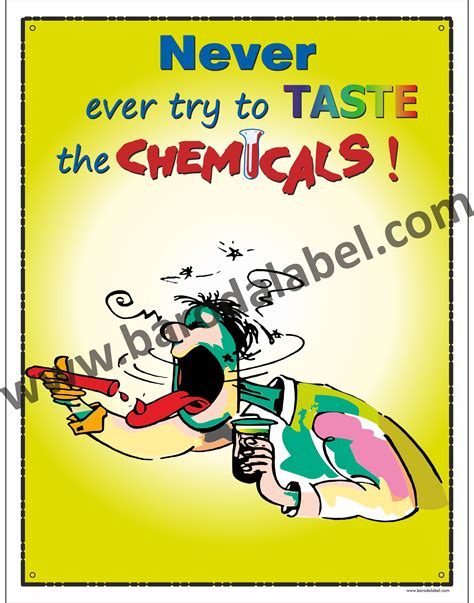The world of chemistry is a vast and fascinating one, full of mysteries waiting to be unraveled and wonders waiting to be discovered. However, with great power comes great responsibility, and the world of chemistry is no exception. One of the most critical lessons that chemists learn early on in their careers is to never taste chemicals. This may seem like an obvious precaution, but it is a warning that cannot be stressed enough. In this article, we will explore the hidden dangers of tasting chemicals and why this practice is so hazardous.
The Risks of Chemical Tasting
Chemicals can be extremely hazardous, and tasting them can lead to serious health consequences. When we taste a chemical, we are essentially introducing a potentially toxic substance into our bodies. The mouth is a sensitive area, and the mucous membranes that line it are highly permeable. This means that chemicals can easily pass through the skin and into the bloodstream, where they can cause harm.
One of the most significant risks of chemical tasting is the potential for poisoning. Many chemicals are highly toxic and can cause severe harm if ingested, even in small amounts. For example, substances like mercury, lead, and arsenic are all highly poisonous and can cause serious health problems if ingested. Even if a chemical is not immediately toxic, repeated exposure can still cause long-term health problems.
In addition to the risk of poisoning, chemical tasting can also lead to other health problems. For example, some chemicals can cause skin irritation, respiratory problems, or allergic reactions. In extreme cases, chemical tasting can even lead to death.
Why Do People Taste Chemicals?
Despite the risks, some people may still be tempted to taste chemicals. There are several reasons why this might happen. For example, some people may be curious about the taste of a particular chemical, while others may be trying to identify a substance. However, these reasons are never valid enough to justify the risks.
In the past, chemists may have tasted chemicals as a way of identifying them. However, this practice is now widely recognized as being extremely hazardous, and it is no longer recommended. Modern analytical techniques, such as chromatography and spectroscopy, are much safer and more accurate ways of identifying chemicals.
Safe Handling Practices
So, how can we avoid the dangers of chemical tasting? The key is to follow safe handling practices when working with chemicals. Here are some tips:
- Always read the label carefully before handling a chemical.
- Wear protective clothing, including gloves, goggles, and a lab coat.
- Use a fume hood or other ventilation system when working with volatile chemicals.
- Never taste or smell chemicals.
- Follow established protocols for handling and disposing of chemicals.
By following these tips, we can minimize the risks associated with chemical handling and stay safe in the lab.
Chemical Safety in the Lab
Chemical safety is a critical aspect of laboratory work. Laboratories are designed to be safe environments, but accidents can still happen if we are not careful. Here are some ways to ensure chemical safety in the lab:
- Always follow established protocols for handling and disposing of chemicals.
- Keep the lab clean and organized, and make sure that chemicals are properly stored.
- Use protective equipment, such as gloves and goggles, when handling chemicals.
- Be aware of the hazards associated with different chemicals, and take steps to minimize risks.
- Report any accidents or incidents to your supervisor or safety officer.
By following these guidelines, we can ensure a safe and healthy working environment in the lab.
Conclusion
In conclusion, the dangers of chemical tasting are very real, and this practice should never be attempted. Chemicals can be extremely hazardous, and tasting them can lead to serious health consequences. By following safe handling practices and taking steps to minimize risks, we can stay safe in the lab and avoid the hidden dangers of chemical tasting.
Gallery of Chemical Safety






FAQs
Why is chemical tasting so hazardous?
+Chemical tasting is hazardous because it can lead to poisoning, skin irritation, respiratory problems, and other health issues. Even if a chemical is not immediately toxic, repeated exposure can still cause long-term health problems.
How can I stay safe in the lab?
+To stay safe in the lab, always follow established protocols for handling and disposing of chemicals, wear protective equipment, and be aware of the hazards associated with different chemicals. Report any accidents or incidents to your supervisor or safety officer.
What should I do in case of a chemical spill?
+In case of a chemical spill, follow established protocols for spill response, including evacuating the area, wearing protective equipment, and neutralizing the spill. Report the incident to your supervisor or safety officer.
